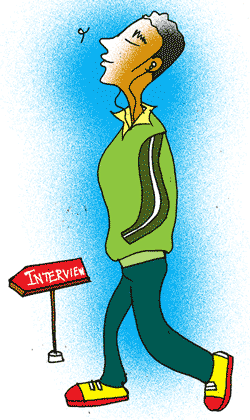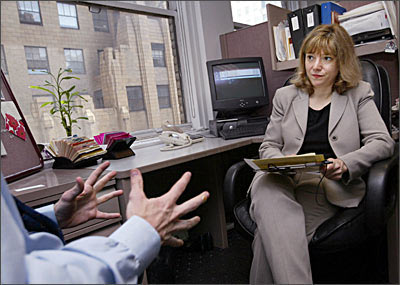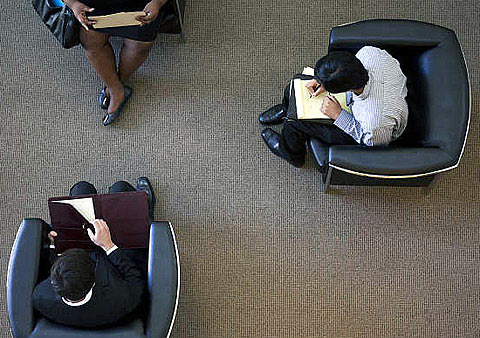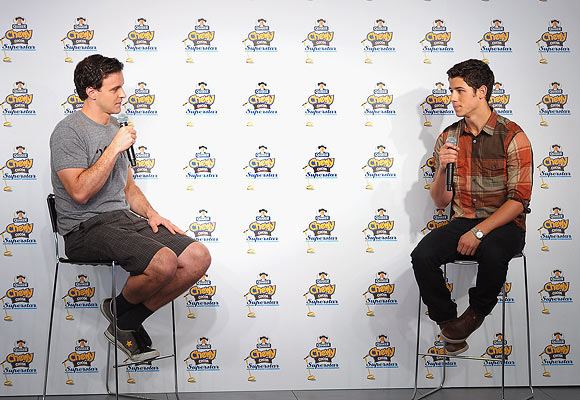
Adman, entrepreneur and author of the book You're Hired! Sandeep Goyal shares some crucial career advice with aspiring professionals.
In a recent interview with rediff.com, Sandeep Goyal discussed why young Indians are going wrong with their job searches.
Here, he points out the mistakes aspiring professionals make while creating a CV and tells us how they can perform better at job interviews (to read an excerpt from Goyal's book You're Hired!, look the same; worse, they don't bother to highlight their achievements.
For a guest relations job, who wants to know about your computer programming skills?
Why share such trivial information and waste precious space?
Invest thought and clarity into writing your CV.
Please click NEXT to continue reading...

What according to you are the most common blunders young professionals commit at a job interview and how can they be avoided?
Most candidates I have interviewed do not realise the importance of prepping for an interview in advance.
Every candidate knows that there are a few questions one can expect in the interview round; questions like 'Tell me something about yourself', 'Why do you want to work for our company?' or 'Why do you think we should hire you?'
These are very basic and direct questions that can be rehearsed before you appear for the interview.
For me, the answer to the first question -- 'Tell me about yourself' -- pretty much decides the course of the interview.
You definitely can't be quiet for two minutes after I have asked you the question, thinking of what to say. And then if you're going to tell me what is already on your CV like your name, and the institute you studied at etc, I think the interview is over for me right there.
Repeating what is already on your CV will add zilch value.
Instead, if you are say, 'As you can see, I have mentioned on my CV that I was school captain and I represented my school in elocution competitions at the national level,' I may be interested in continuing the conversation and finding out more about you as a person and prospective candidate.
Believe me, the first two lines you speak are going to trigger the next few questions.
If you talk about your interests, you will be quizzed on what your interests are; if you talk about some significant achievement or project from college, the interviewer will ask you more about what you learned from it.
If a candidate doesn't have an answer to a crucial question at an interview, what is the best way to confront the situation?
If it happens once, you can always excuse yourself and say: 'I'm sorry, I don't have the information.' That's being honest.
But if you are going to answer with an 'I don't know' to more than three questions, know that you are not getting the job, because it's no longer an issue of honesty but a lack of proficiency and homework.
Of course there are those exclusive moments when you are not mentally prepared for an interview and you know that you can do better than you're doing.
In such cases, you may request the interviewer to give you a second chance.
It has happened with me -- this guy I was interviewing was going through a bad phase and none of his responses could hold my attention. He sensed my disinterest and requested a chance to come back and see me again later. I said okay and forgot all about it.
A few weeks on, he called and asked if he could come meet me. I agreed. And when I met him for the second time, he was a completely different person -- he was confident, and spoke so well that I hired him.
These are exclusive cases of merit, but if you are really positive that you can turn things around given another chance, you can always request the same from an interviewer.

What are the things one should avoid discussing at a job interview?
Any mature interviewer will ideally avoid questions about your marital status. I agree that is a very personal question to ask and sometimes the interviewer may hold it against you.
At the same time, I must confess that when I interview women, I ask a very different but important question. I ask: Where do you live?
For me, if a candidate stays in Noida, her commuting to an office in Gurgaon will be hectic and affect productivity. So, I try and explain to them that this could be a problem.
To answer your question, I'd say unless specifically asked, avoid sharing personal details, and polarising viewpoints on religion and politics.
Obviously much of such a situation depends on the interviewer, but you have to cleverly tackle these questions.
According to me the gender-bias, at least in job interviews, is negative.
Is there a way to measure the success of an interview?
Every candidate should be able to distinguish between a good and a bad interview.
A bad interview will not last beyond five minutes and will usually end when the interviewer says: 'Thank you very much, we'll let you know.'
Instead, if the interviewer greets you with a handshake and says, 'It was a pleasure meeting you. My HR team will get in touch with you,' know that you've had a good interview.
Can you please share some of the most interesting questions you've asked candidates at an interview?
In the advertising agencies where I've worked, we'd often try and test candidates for creativity and impromptu thinking.
For instance, one of the flippant questions we asked candidates was whether they had a girlfriend or boyfriend. If the answer was yes, we'd ask them to write a love song to their partner.
If on the other hand the candidate was recently out of a relationship, we'd ask them to create a Twitter message announcing the same.
It was interesting to see how they responded, because at an advertising agency we are keen on knowing what innovation our employees can bring to the table, more than anything else.
Regardless of what position you are applying for, I feel candidates must be prepared to tackle such impromptu situations as well. A lot of international companies are known to hire people for their out-of-the-box thinking rather than for their academic proficiency.

Kindly share some dos and don'ts for group interviews.
That is a very interesting question. A couple of years ago, I was the chairman of a joint venture company and I've stumbled upon some peculiar observations about group interviews.
For instance in India, at a group interview where there is one Japanese and one Indian on the employers' panel, 99 per cent of the candidates presume that the Japanese guy must be the boss.
In such a situation, the point is to tactfully find out who the most important person on the panel is -- the one who will have the final say in your recruitment.
Don't be foolish enough to think that there will be democracy in the decision-making process; you have to be smart enough to figure out who that one person is who will vote for you.
If you fail to crack this in the first five minutes, the least you can do is treat everyone on the panel equally, making good eye contact and speaking with conviction.
How does one prepare for a video interview?
Unlike personal interviews, in a Skype or video interview, the interviewer sees only part of your profile. The interviewer cannot see what clothes or footwear you have on. Hence your facial expressions become very critical.
Watch out for interruptions -- if you are carrying a phone, don't forget to switch it off before the interview. Answering a phone, checking Twitter or texting someone in the middle of an interview are very big letdowns.
On video, simple things like scratching your nose or head while answering a question can look bad.
If you have never done it before, get a friend to interview you on Skype.
Ask him to tell you how you sound on the mic -- is your voice clear or muffled, were you able to communicate effectively? Practice and perfect it until you are confident.
For an aspiring professional, how important is attire? More importantly, how should one dress for a job interview?
Even though I have spent a large part of my career in the advertising industry, when it comes to what to wear I'm an extremely conservative person.
The young generation may think that stubble or a long mane looks 'cool' on a guy, but for me, if you are going to represent my company, I'd expect you to shave everyday and at least comb your hair and brush your teeth before you come to work.
Young professionals also tend to take Friday dressing at face value. There was this candidate who'd applied for a senior position, he came dressed in a tee-shirt -- not even a plain one, one with some random quote on it. It completely put me off.
Also, it's a bad idea to wear denims to an interview.
I don't expect men to wear a blazer, but it's only professional to wear a light-coloured shirt with a jacket or a tie, paired with dark trousers, a pair of socks and shoes. You don't have to wear laced shoes, but you can try and wear black or brown shoes, preferably leather, to an interview.
Girls, if you don't want to err, wear a decent Punjabi; when it comes to Western wear, most Indian women I think are yet to get it right. I'd suggest a well-stitched kurti with trousers. And unless you have fabulously indulged in a pedicure and polished your nails, don't wear a pair of sandals to an interview. God forbid, if you have bad toenails and the nail polish is chipping off, you are doing yourself a great disservice by showing your feet. Closed shoes are always considered safe for women.
The other thing is hair. There is a fair amount of formality involved with hair. You may have great-looking hair, but if you choose to leave it untied for an interview, you may create a flirtatious or less serious impression. I prefer it braided, but you can fold it into a bun and have it look professional.
In nine out of ten interviews, too much makeup is also an issue. Exceptions to the rule would be if you are applying for a job in the hospitality industry. Here you are required to put on necessary makeup, it's part of the profession. But in all other situations, you have to appear for an interview as if you're coming in to work there.
Untidy or unkempt is a problem; be normal and formal.